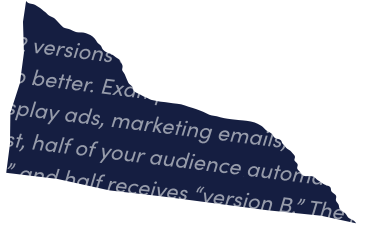Cost per click (CPC) is a pricing model in digital advertising that reflects the price an advertiser pays for every click on their ad. CPC (sometimes referred to as PPC or Pay Per Click) is a popular way to run campaigns, as advertisers only pay when someone interacts with the ad. CPC is used for a wide range of online ads from Google Shopping and video ads to social media ads, display ads, and native ads.
What is Cost Per Click?
CPC (or Cost per click) is a pricing model used in paid ad campaigns, where advertisers pay each time an ad is clicked. Advertisers bid on specific keywords or placements for their ads, and the cost per click is determined by the competition for those keywords or placements. The higher the competition, the higher the cost per click. CPC is commonly used in search advertising, social media advertising, display, and native advertising. With CPC, advertisers only pay for the actual clicks they receive on their ads, rather than paying for impressions or views that may not result in any clicks or conversions.
Why CPC matters
CPC is important because it allows advertisers to measure the effectiveness of their campaigns in terms of user engagement. By only paying for clicks, advertisers can see how many people are actually interested in their ad and taking action to learn more or make a purchase. This helps to maximize the return on investment (ROI) of the advertising budget.
CPC is also useful for optimizing campaigns and adjusting bids to achieve the desired outcomes. By monitoring the cost per click, advertisers can identify which keywords and placements are generating the most clicks and conversions, and adjust their bids accordingly to improve performance. This allows for more targeted and efficient advertising campaigns.
Generally, the lower the cost per click, the better. If your cost per click is high, you’re paying a lot for your ad clicks, and you should reconsider your targeting strategy.
Overall, CPC provides a transparent and measurable way to track the success of digital advertising campaigns and helps to ensure that advertisers are only paying for meaningful engagement with their target audience.
How to calculate Cost Per Click
CPC is calculated by dividing the total cost of the ad campaign by the number of clicks received.
Here is the basic CPC formula:
CPC = total amount spent / total measured clicks
For example, if you spent $500 on the ad campaign and got 100 clicks, your CPC is $5, which is pretty high.
When launching a digital ad campaign, the advertiser pre-defines the maximum CPC they are willing to pay, and the maximum daily budget. The CPC will adjust automatically in live auctions to get the best possible ad placement at the best price.
Therefore, there are many factors that affect the bidding price, which also influences your CPC.
First, there’s the simple rule of supply and demand. The more people want a certain product or service, the more likely you are to get lots of people clicking. This is great on the one hand, but on the other, it can drive up the cost of bids, which in turn will make your CPC higher.
Location is another factor to consider. Businesses within city limits (and expensive cities at that) will have high CPCs because everything is more expensive in urban areas. Keyword density matters too – in a highly competitive industry, such as insurance, loans and attorneys, everyone wants a piece of that web traffic pie. That means you’ll be competing for keywords in your ads, which is expensive.
Then there’s also network choice to consider. Online ads cost more on Google search than any other platform, while display ads are known to give the lowest cost per click at just under $0.50 per click.
What is a good CPC?
A good CPC depends on how much ROI you’ve gotten for your spend. Usually, you want to make at least 20 cents back on every dollar spent. A really good CPC rate would be to double the return on your investment, earning $2 for every dollar spent. Of course, the average CPC is different depending on what industry you operate in and what type of ad you’re using.
Taking a general look across industries, the highest CPCs across the board is in the consumer and professional services industry. Law firms have a common CPC of $6.75, as they have a lot of bidders driving up the price. The cost for “medical malpractice attorneys” has been reported to go as high as $200 per click.
While not as high as lawyers, the CPC of accountants, tax pros, and financial advisors is about $5.48 with auto insurance right behind at a rate of $5.19.
On the lower end of the scale are jewelry stores, which come in at a low of $1.16 per click, food trucks, which hold an impressive $0.64 CPC, and the lowest of them all – barbershops at just $0.49.
CPC vs CPM (Cost per 1000 impressions)
Now that we’ve defined CPC, you’re going to come across another term that’s important to know. CPM or cost per thousand (the “m” stand for mille, which is 1,000 in Latin) refers to every thousand times your ad is shown. Note the difference here – CPC is about clicks which require the viewer to take an action, while CPM is about impressions, or simply ad views, where there is no viewer action.
CPM is mostly used when brands want to be seen, and create awareness and talkability, while CPC is about driving clicks and conversions. CPM is a less powerful metric than CPC because it does not indicate any specific audience action. With CPM, there is no way to measure the impact of the ad, or to know whether the user paid any attention to it, or that it had any effect on the individual.
What is eCPC (Enhanced Cost Per Click)?
eCPC is a type of online bidding strategy that raises and lowers your bid on an ad according to certain cues in real time. This is referred to as a semi-automatic strategy because you can set it to work without constantly monitoring it. The algorithm that makes this strategy possible gathers data from a variety of sources to predict how many clicks will probably result in a conversion. If that number is low, your bid will be dropped, while a higher number will cause your bid to be raised.
One of the drawbacks to eCPC is that while you can set a budget, you won’t be able to set a bidding cap. That means you might spend a lot of money on a click that’s more likely to convert but have nothing more left to spend for that period of time.
How to reduce CPC
Advertisers recommend these strategies to make the most of your budget and lower your CPC:
- Ensure your ad is relevant: People search online for fairly specific things. For example, they probably wouldn’t search for “legal, insurance, and medical malpractice companies”. Focus your strategy on specific and relevant keywords. This will more quickly show you which ads are working and which are not, so your ad spend can be targeted more effectively, which in turn lowers CPC.
- Quality Score matters: Quality Score is the rank of your ad’s relevance and quality in comparison to other ads. A good quality score will really help your CTR (or click-through rate), and also your CPC.
- Lower your ad bids: Sometimes you can lower your ad bids without impacting your CTR. This is something to experiment with, so try dropping your bid in small increments and see if this affects your CTR. If it stays the same, your CPC will decrease.
- Think about where, when, and on what device your ads are being viewed: Bidding is about more than keywords or industries. Device types, location, and times matter too. Keep an eye on where your ad traffic is coming from, and whether your audience is using mobile, desktop, or another device. Also, ask yourself what day of the week converts the most, and at what time of day people are clicking. These factors will help you remove irrelevancies from your ad campaign, letting you allocate more budget to the higher conversion potential factors, thereby lowering your overall CPC.
- Avoid overly-competitive keywords: Keywords are not created equal, and with very competitive keywords come higher CPCs. Unless you want to compete with large, high-budget advertisers, try not to bid on competitive keywords. They’ll drain your budget while keeping your CPC way too high.
There are so many factors that impact CPC so it may fluctuate a lot. As an advertiser, it’s important that you stay flexible and dynamic, trying and testing ways to reduce your CPC and reach the best optimization tactics. Be sure you also have very clear goals for your ad campaigns, so you can use CPC as a guidepost for how to achieve them.


